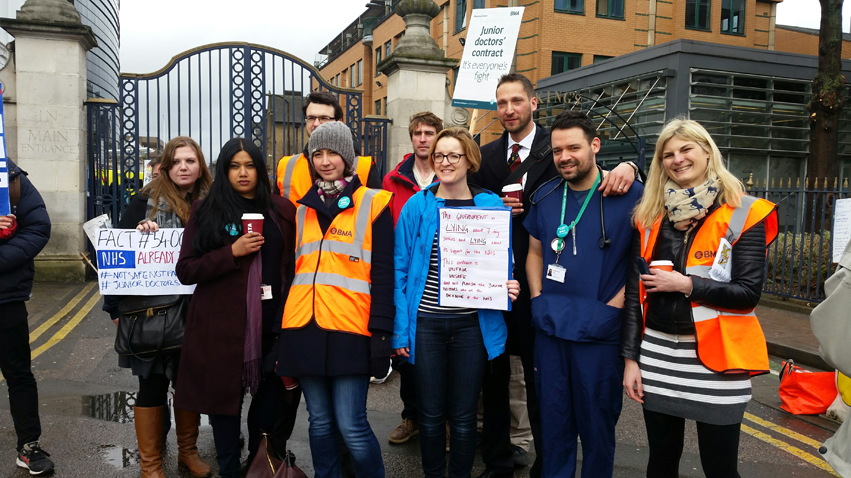
KING’S College Hospital Foundation Trust (KCHFT) management has been accused by the Unite union of ‘racism, discrimination and bullying’ as staff-side joint partnership meetings are withdrawn in response, according to a report in the Health Service Journal.
The staff-side committee of the major London hospital trust has stopped working with its leadership, with its chair, Irene Pilia, alleging an ‘endemic’ culture of ‘racism, discrimination and bullying’.
Pilia, the senior KCHFT Unite representative as well as staff-side committee chair, told colleagues that the decision was taken ‘in the interests of staff’, especially black, Asian and minority ethnic workers, and expressed concerns about the organisation’s disciplinary procedures.
She said the decision to withdraw partnership working had the backing of staff committee officers and delegates.
Pilia said she was open to resuming partnership working again, but told trust executives: ‘I have lost trust and confidence in the ability of KCHFT to conduct fair, impartial and no-blame investigations.
‘Until there is tangible and credible evidence that racist behaviour at all levels is proactively eliminated, such that perpetrators face real consequences (including to the detriment of their careers) for their actions and are no longer allowed to behave in racist ways with impunity, I take a stand for the hundreds, possibly thousands of KCHFT staff whose voices are not being heard.
‘The trust needs to take action, decisively and promptly. When it does, I will be there as part of the conversation. If instead, the trust continues to plough its present course, I will no longer provide the “comfort” that the trust acts with my support.’
King’s was criticised in the summer when it gave external candidates just 10 days to apply for a temporary role as equality, diversity and inclusion director.
In correspondence seen by HSJ and sent earlier this month, Pilia listed several concerns in her emails and cited a ‘culture of racism, discrimination and bullying endemic across the trust’, which she said she had raised previously but had not been addressed as she wished.
She added she had become increasingly concerned by the ‘calibre of pre-disciplinary “fact-finding” investigations’, which appeared to have come after she represented several BAME staff going through disciplinary or grievance procedures within the last six months.
Pilia also said she had called for an independent investigation into the management practices of one department which, she alleged, is ‘notorious’ for its bullying culture in August.
It was after not hearing back from the trust leadership, after raising these concerns, that she decided to withdraw joint partnership working, according to the correspondence.
She said: ‘I’m tired of hearing, “We are committed to change.” I’m tired of hearing, “We are committed to addressing racial prejudice.” I’m tired of hearing, “We are committed to eliminating discrimination in all its forms,” while little changes for staff on the receiving end of racist and bullying behaviours.
‘I’m tired of hearing, “Change takes time.” Well, it certainly does when those with the power to enact change do nothing to bring about change when presented with an opportunity to do so.’
She added: ‘If the trust is not going to take notice of the concerns raised by the chair of its unions, I see little point in participating in what is, therefore, no more than tick-box exercises of co-chairing joint consultative committee and policy review group meetings.’
A KCHFT spokeswoman said the trust was unable to comment on issues related to individual members of staff, but confirmed that trade union participation in the trust’s partnership working arrangements has been temporarily suspended.
She told HSJ: ‘The trust continues to have constructive discussions with both local representatives and regional officers. We have made good progress on agreeing a way forward, and all parties are committed to a resumption of normal partnership working as soon as possible.’
When asked whether joint partnership working had been suspended trust-wide, she added: ‘We continue to have constructive discussions with all our trade union representatives outside our standard partnership working meetings.
‘Trade union representatives also continue to participate in meetings aimed at resolving issues relating to individual members of staff.’
- The BMA expects GPs to ‘play a significant part’ in any upcoming Covid-19 vaccination campaign, despite government preparations for a wider workforce to give vaccines at centralised sites.
Last Friday, new laws came into effect enabling midwives, nursing associates, operating department practitioners, paramedics, physiotherapists and pharmacists to be trained to give both Covid and flu vaccines.
At the same time, a leaked document obtained by the Economist and the Sun revealed government plans for mass Covid-19 vaccinations at large-scale ‘Nightingale Vaccination Centres’ – including in Leeds, Hull and London.
However, BMA GP Committee chair Dr Richard Vautrey told Pulse that it is the BMA’s expectation that GPs will have a significant role in administering Covid vaccines.
The comments come as Pulse exclusively revealed last week that talks are taking place at the highest levels around mobilising for a potential Covid vaccine from December, with some sources putting the chances of the programme being started this year as 50/50.
Dr Vautrey said this ‘huge’ vaccination campaign will require significant ‘support’ for practices.
Dr Vautrey told Pulse: ‘While we don’t have a specific date when the vaccines will be ready, the BMA fully expects general practice to play a significant part in administering them, and practices will require significant support for what is set to be a huge immunisation campaign.’
Grassroots GPs told Pulse they fear the impact a large-scale Covid vaccination campaign run via practices would have on their workload.
Dr Ankit Kant, a GP in Norfolk, said he believes practices would carry it out ‘fantastically well’, but he added: ‘This additional work needs to be a fully resourced activity with an adjustment into how we can deliver primary care whilst under unprecedented demand.
‘This isn’t simply about funding, but about recognising and responding to what is going on with primary care currently; unprecedented demand, dealing with more secondary care dumping, whilst trying to cope with being bashed in the media continually.’